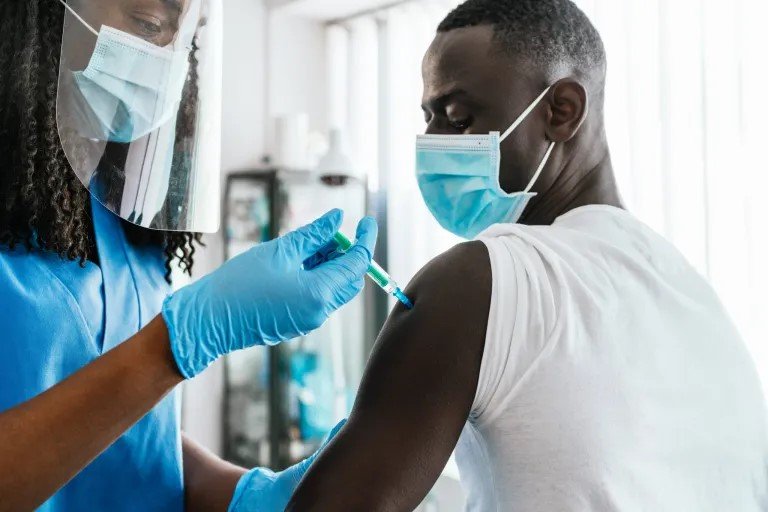Experts Fight Vaccine Misinformation in Virus Season
Credit: Alina Kolyuka via Getty Images.
As flu season approaches, now is the time to get vaccinated for COVID-19, RSV and the flu. Here’s what you need to know.
By Anissa Durham
Vaccinations, unfortunately, have become a hot topic of debate, controversy, and misinformation, often fueled by disinformation campaigns and anti-science propaganda. But experts unwaveringly say they are necessary, and the data show they do save lives.
With respiratory virus season quickly approaching, experts break down what you need to know about the latest COVID-19, RSV, and flu vaccines. Otto Yang, professor of medicine and associate chief of infectious diseases at the David Geffen School of Medicine at the University of California, Los Angeles, says vaccines are the most effective way to prevent serious illness and death from respiratory viruses.
Why does this matter? The Centers for Disease Control and Prevention predict that this year’s respiratory disease season will have similar results to last year, which brought about more than 20 hospitalizations for every 100,000 persons.
Facts Save Lives
With the amount of misinformation and disinformation about vaccines, it’s critical to find fact-based and accurate information. As previously reported by Word In Black, the consequences of vaccine misinformation and disinformation can result in death.
Credit: KoldoyChris via Getty Images.
“Realize that just having an M.D. or Ph.D. does not necessarily mean you are an expert in this field,” Yang says. “You really want to seek out experts, people who have devoted their careers to studying vaccines … and preventing disease. It’s a common misconception that someone that has an MD is a scientist. They’re not.”
A sea of bad information, particularly on social media platforms, and spewed by political leaders with anti-vaccination attitudes, has only exacerbated the need for accurate vaccine information. As seen with COVID-19, it can be a matter of life or death. Here’s the latest evidence-based information on vaccines for respiratory viruses.
What to know about the latest vaccines
Older adults, infants, and those with compromised immune systems are at a higher risk of severe illness from these respiratory viruses, Yang says. And individuals who work with children or in crowded settings are more at risk for exposure.
Everyone 6 months and older should be vaccinated for the flu, according to the CDC. And the trivalent flu vaccines for the 2024-2025 season protect against the H1N1 virus, H3N2 virus, and B/Victoria virus.
But the data show some disparities in flu vaccination rates. Despite facing higher risk of exposure and serious illness, from 2015 to 2021 Black nursing home residents had the lowest flu vaccination rates.
The recommendation is much the same for the COVID-19 shot. Everyone 6 months and older can get the 2024-2025 COVID-19 vaccine, regardless of whether an individual has received a previous vaccine. The updated vaccine was approved by the Food and Drug Administration on Aug. 22 to provide better protection from current strains of the virus.
Before the latest COVID-19 vaccine, in a weekly tracker from January to May 2024, COVID-19 vaccination rates steadily increased, but Black and Hispanic adults still had lower rates.
Respiratory syncytial virus can be especially deadly for premature infants, children two years old or younger, and older adults. The vaccine was typically given to young children, but last year, an RSV vaccine was approved for older adults.
Related: How Parents Can Protect Babies From RSV
Earlier this summer, the CDC updated its recommendations for the RSV vaccine for everyone ages 75 and older to receive it and adults 60-74 to receive the vaccine only if individuals are at increased risk of severe RSV.
To lower the risk of infection, Yang recommends people limit exposure to crowded spaces and take care of their health overall. Most doctors’ offices and local pharmacy’s offer the COVID-19, RSV, and flu vaccines.
“It’s a mistruth to say that vaccines don’t keep you from getting COVID-19, so you shouldn’t get vaccinated, but in fact, they prevent you from dying,” Yang says. “That’s the bottom line.”


